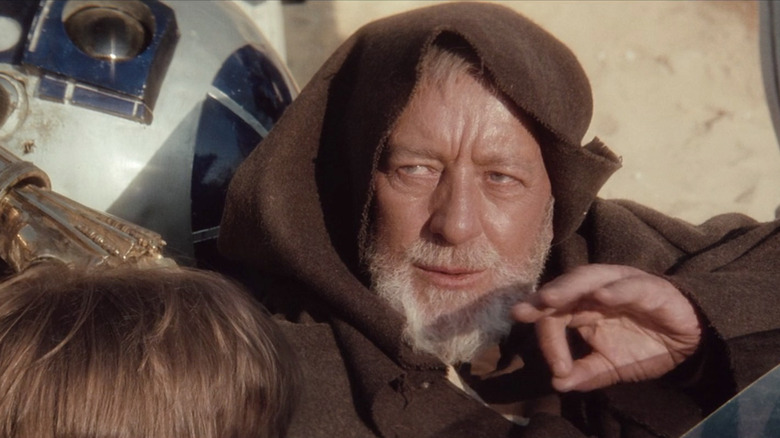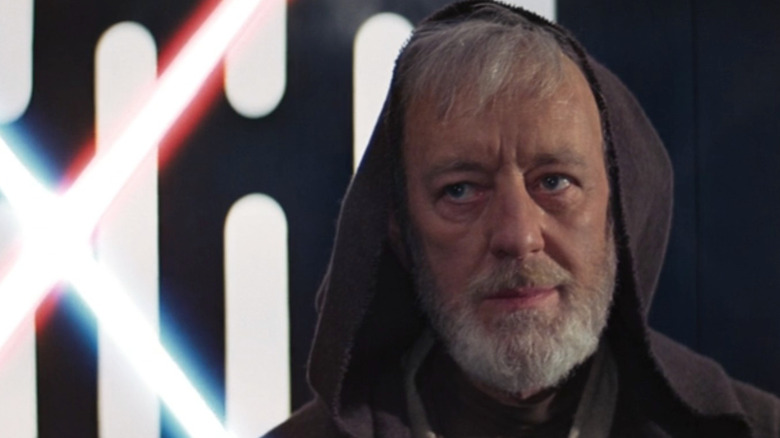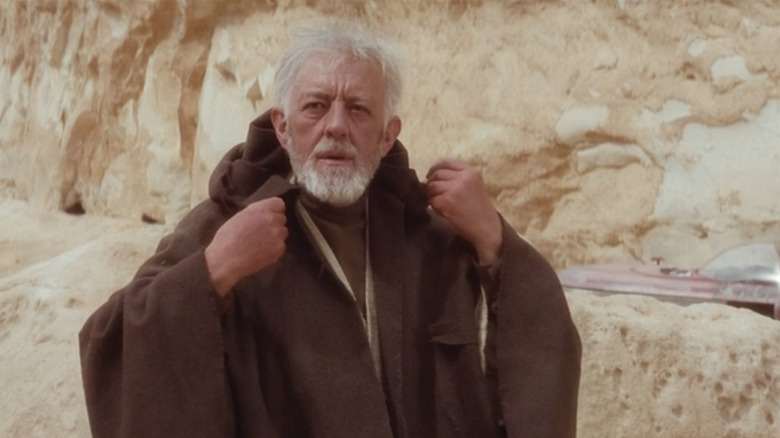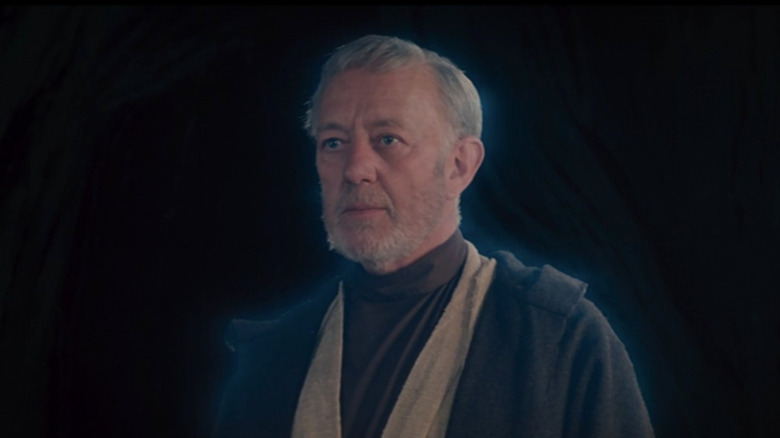The George Lucas Lunch Meeting That Saved Star Wars From Disaster
Before "Star Wars" hit theaters in 1977, the world had no idea it would take over the popular consciousness, spawn sequels, prequels, TV series, comics, books, and video games. This story of a young man who leaves his home to become a hero was powerful — and all the more so because of something the character of Obi-Wan Kenobi (played by the late Sir Alec Guinness) does late in the film.
Guinness had decades of experience on the stage and had starred in films like "Great Expectations," "The Bridge on the River Kwai," "Doctor Zhivago," and Lawrence of Arabia" before taking on a role in this as-yet-unknown space opera. He wasn't always supportive of the first "Star Wars" film. Though he's also said positive things about it, the movie wasn't exactly his usual kind of work. Plus — spoiler alert for an over four decades-old film — his character dies and comes back as a Force ghost.
That plot point in particular didn't sit well with Guinness and led to a difficult discussion with creator George Lucas. That discussion, in fact, kept the film from disaster, according to the book "The Making of Star Wars: Enhanced Edition" by J.W. Rinzler.
'He was ready to walk off the picture'
We all know that Obi-Wan Kenobi's sacrifice in his battle with Darth Vader is the catalyst for Luke Skywalker's story arc in the final act of "Star Wars" and the rest of the trilogy. In death, the older Jedi who has watched over young Luke for his entire life did one last thing in life for the son of his former friend and padawan, Anakin Skywalker. He sacrificed himself, turned into a Force ghost, and continued to guide Luke in his use of the Force.
Guinness, however, didn't see that as the film was being made. According to the book, Guinness was mulling over this and when the production got back from shooting scenes in Tunisia, he wanted to meet with Lucas about it. They met at a restaurant, and Lucas recalls:
"He was terribly upset. He was ready to walk off the picture — he said, 'I'm not doing this.' He didn't like the idea of being a ghost. That's the part he really didn't like, the idea of giving yourself up willingly to join the Force. So I had to convince him to come back on the picture."
Just try to imagine "Star Wars" if Obi-Wan didn't die. Would he have just been standing around during the final Death Star battle? Gone back to his cave? Continued to train the young Skywalker, so that we never get to meet Yoda in the next film? Obi-Wan surviving would have taken so much of the motivation away from Luke, for whom losing his mentor was a pivotal moment in his life.
'I had to explain why I was doing it and what I was doing and how'
George Lucas explained all of this during his crucial meeting with Alec Guinness, telling the actor that there wasn't really a path for Obi-Wan in the film if he didn't die in that battle with Darth Vader:
"That was a very long lunch, during which I had to explain why I was doing it and what I was doing and how. I explained that in the last half of the movie he didn't have anything to do, it wasn't dramatic to have him standing around, and I wanted his character to have an impact. Once I explained it was much better for the movie, he looked at it and said, 'You're right. This is much better.' He started to think about what he was going to have to be doing and how it would've been embarrassing to simply be standing around without much purpose."
Obviously it worked, and Obi-Wan's death and ghostly advice helped spur Luke Skywalker on to save the galaxy.
'The idea of having Ben go on afterward as part of the Force was a thematic idea that was in the earliest scripts'
George Lucas also mentioned a book that influenced his take on Obi-Wan Kenobi, explaining, "The idea of having Ben go on afterward as part of the Force was a thematic idea that was in the earliest scripts. It was really a Castaneda 'Tales of Power' thing."
He's referring to the 1974 book "Tales of Power" by American author Carlos Castañeda. He wrote about his shamanic training with a "Man of Knowledge," though his work in this area is largely considered fictional by many. The book talks about spiritual teachings with an older mentor, and explains that everything in the universe, including people, are a form of energy. Sound familiar? As Obi-Wan tells Luke, "The Force is what gives a Jedi his power. It's an energy field created by all living things. It surrounds us and penetrates us. It binds the galaxy together."
The discussion worked because, as Mark Hamill later said, "Alec thought it would be far more effective if he sacrificed himself." It's odd to think what would have happened if that lunch meeting had gone badly and Guinness had left the production, or if the script had been changed. Maybe we never would have gotten "Star Wars" at all — and that doesn't bear thinking about.
All the "Star Wars" films and TV series are streaming on Disney+.



